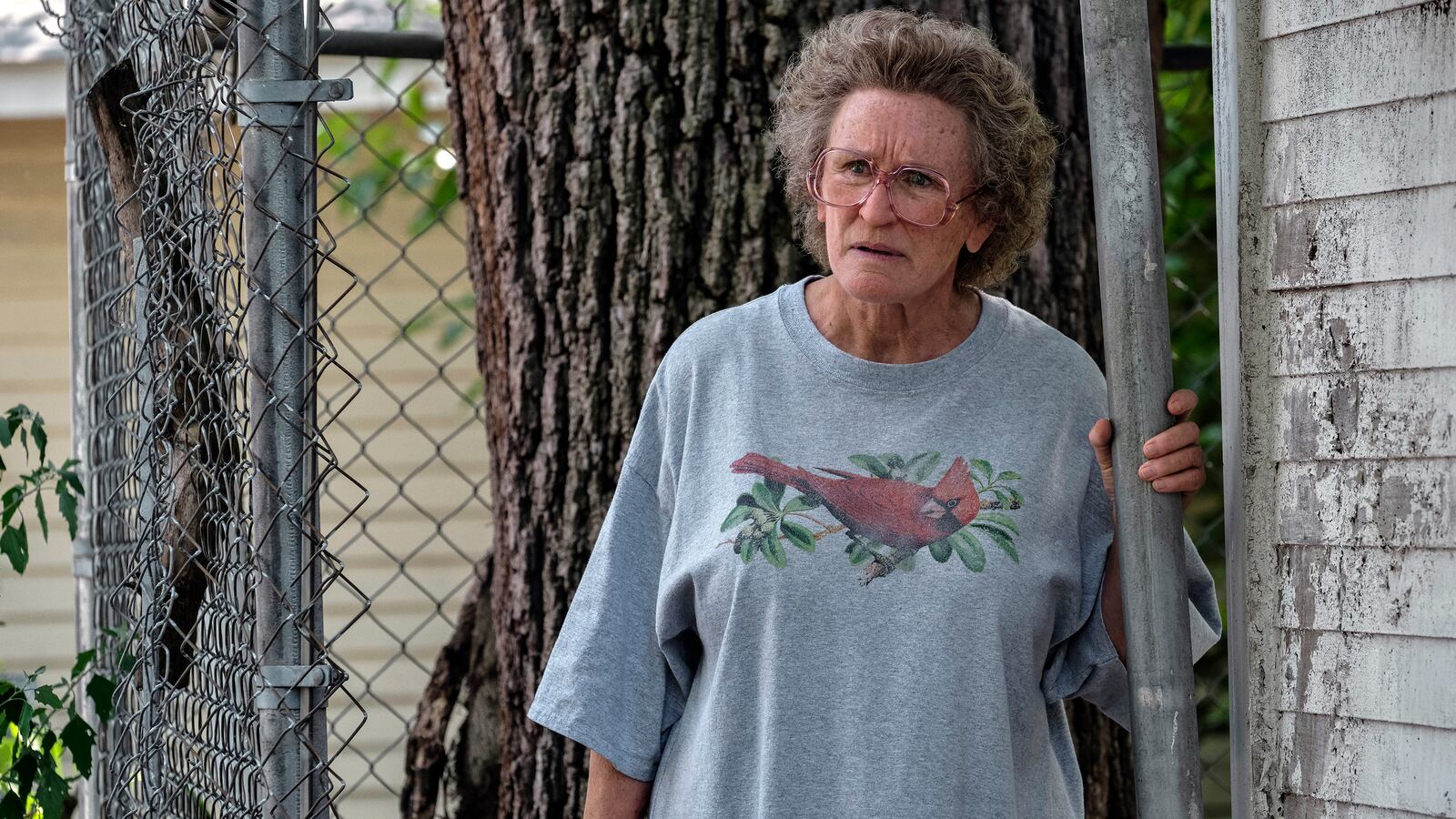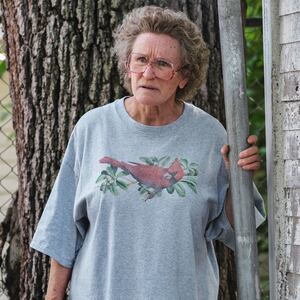On Sunday night, Glenn Close might finally win a long-deserved Oscar for Best Supporting Actress for Hillbilly Elegy. She was also this close to scooping up the coveted award’s antithesis—a Razzie for Worst Supporting Actress for the same role.
Despite being the 41st annual Razzies, Close’s nomination only marks the third time an actor has been up for both an Oscar and a Razzie for the same performance, joining the ranks of James Coco in Only When I Laugh in 1981 and Amy Irving in 1983 for Yentl.
Dreamt up by co-founders Maureen “Mo” Murphy and John J.B. Wilson in 1981, the Golden Raspberry Awards have long been about good old-fashioned fun, taking a lighthearted jab at Hollywood’s leading men and women.
Longtime friends Murphy and Wilson are yin and yang, evident when discussing Close playing Mamaw in the film adaptation of J.D. Vance’s biography, starring Amy Adams, Gabriel Basso, and Freida Pinto. While Murphy commended Close’s “authentic” performance, Wilson couldn’t even get through the film.
According to the co-founders, there were lots of stinkers this year, especially because the pool was made even wider due to streaming services’ films now being eligible for Oscar consideration. “This year, there’s no way people could see all the crud that was out there,” Wilson told The Daily Beast.
Despite Close’s divisiveness, dancer Maddie Ziegler was bestowed the Razzie for Worst Supporting Actress for her role in the polarizing Music on Saturday. Murphy said she was rooting for the film to succeed, noting her fondness for the singer Sia. But overall, she said, it fell flat.
Wilson, while admitting it was bad, said he enjoyed Jackie Chan and Arnold Schwarzenegger’s action-fantasy movie Iron Mask “enormously because it made no sense at all, but it was very loud and colorful and had ridiculous costumes and pretty cheesy special effects.”
Both agreed MyPillow CEO Mike Lindell’s documentary about supposed election fraud Absolute Proof was a drag. “I leaned on the scan button a lot when I was watching that,” Wilson laughed.
But it was Dolittle and the very raunchy Netflix film 365 Days that racked up the most nominations, each earning six nods, including for worst picture, actor, screenplay, and remake/rip-off.
The Daily Beast had a chat with Murphy and Wilson about Close making history, speculating if 2020 made the Oscars irrelevant, Sandra Bullock being a good sport for showing up at the Razzies in 2010, and what the future holds for theatrical releases.
So, Glenn Close is nominated for both a Razzie and an Oscar. Were you surprised by that?
Murphy: I personally liked the performance very much, but our membership can think differently. They might have thought it was over the top, or something like that. I thought the performance was very authentic. I'm not surprised that it's up for an Oscar, but that's just the way it goes, we have to adhere to our memberships.
Wilson: I personally couldn't get through the movie. When the mom had her second overdose, this time of year, obviously, we're both very busy, so I just thought, “I don't like these people” and moved on to something else.
Murphy: I just thought it was very authentic. In the past, I worked at HBO for many years, pulling performances for the Emmys. That's why I'm not surprised that it's up for an Oscar… but everyone has an opinion.
Wilson: What we did this year, for the first time, is in addition to the forum that's on our website, we sent out a special request to all the members saying, “Look, there's so much stuff with streaming suddenly eligible, we'd like guidance from you.” It was various responses that brought Hillbilly Elegy to our attention. It has been a very divisive film… the public likes it better than the critics did. So, it's a split dichotomy.
If you had to predict, in your opinion, who will win the Oscars for Best Supporting Actress? You think that Glenn has a good shot at it?
Murphy: Yeah, I do.
Wilson: If I were an Academy member, they haven't invited me, I would be voting for Amanda Seyfried as Marion Davies. The movie was kind of choppy and an oddball, but I thought her performance was amazing.
Do you think people even care about the Oscars anymore, especially after this past year?
Wilson: I’m fully expecting that the Academy will be shocked at how much viewership drops this year. With all of us having gone through what we did over the last calendar year, the idea of three hours of rich people patting each other on the bottom and air kissing towards one another over a little gold naked man really isn't that relevant. Maybe we aren’t either, but we're not patting [nominees'] bottoms. But I'd say it'll be interesting to see. Do we take a hit this year as well?
Murphy: I like the Oscars. The reason I do like them is because they can highlight a good piece of filmmaking that people otherwise might not have known about. So, I don't have any ill will towards them at all. They have a purpose; we have a purpose. It's OK, it's all good. Ours is hopefully a little bit more fun. We like to bring that humanity to celebrity and that's our role. So, I don't have any problem with the Oscars, I want the Oscars to succeed.
There’s a little over 1,000 members who vote in the Razzies. Can you tell me about the voting process and who these members are?
Wilson: We have dues-paying members who are members of the general public. We have people in the business, some of whom pay dues, some of them don’t. Then we also have film and entertainment journalists and critics. I think we're the only awards organization that has all three of those branches represented. The bulk of our membership, and certainly the general public membership, is on the West Coast. We have members in Canada, we have members in New York, our foreign contingent, I think our biggest one is the UK. But we do have members in South America, in Europe, and Australia.
Murphy: It's somewhat along the lines of the Spirit Awards, which there's a membership—I'm a member of them as well—and anybody can be a member with the ability to vote. We think of [our membership] as anyone with an opinion and they're willing to put down two cents to express it.
Wilson: At least once we were called ‘the people up in the balcony with peashooters.’ We do think we pretty accurately represent popular opinion.
Murphy: With a critical eye as well.
Wilson: I do think we've done a reasonable job of taking on things that at least a case can be made they deserved this award. I don't think we've ever just slammed somebody because we wanted to be mean.
That brings me to Sandra Bullock. She’s a great example of a good sport. She won worst actress and then the next day she won the Oscar, although they were for different movies.
Wilson: She actually skipped out on a major charity event to show up and accept her award. Her take was, “I brought the script, I can read a line and then let's hear you read it better.” It was a really funny take I've never heard anyone else have. She also had behind her a wagonload of DVDs. She said, “I'm giving these to you to watch because, given the grosses of the movie, I can't believe as many people saw it as are in this auditorium,” which was very funny.
Murphy: We encourage people to come and either dismiss or deny what we've done. To defend it or to agree with it. It's really smart of a celebrity to do that because they endear themselves to the audience.
It’s just a fun little roast.
Murphy: Yeah! We all make mistakes, so it humanizes the celebrity of it.
Due to the pandemic, lots of theatrical releases were delayed or pushed to streaming services. Did you notice any other big changes?
Murphy: They had a locked-in audience. It did make them have to compete because the pie is split up a bazillion different ways. I think it was easier to get to the audience via the television—people are literally locked inside their homes, as opposed to getting people out to the theaters.
Wilson: Watching a movie in the dark with hundreds of strangers is a very unique, and I have always thought, interesting experience. If you were sitting there laughing at something that was supposed to be dramatic, it's just you laughing alone. If you're in the theater there’s 100 other people also laughing.
Murphy: [At home] you have the distractions and the ability to just turn it off and do something else.
Wilson: I can walk away or go do dishes or laundry. What I think is sad about the whole lockdown and the lack of theatrical releases, I don't personally expect it's never going to come back at the level it was at before all of this happened. I think it’s a wonderful experience to sit in the dark with strangers and all of you are hearing and reacting to the same thing. I think that's quite sad, but I hope I’m wrong.



